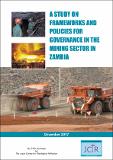| dc.contributor.author | Nyirongo, Griffin | |
| dc.date.accessioned | 2021-01-18T13:54:51Z | |
| dc.date.available | 2021-01-18T13:54:51Z | |
| dc.date.issued | 2017-12 | |
| dc.identifier.citation | JCTR (2017). A STUDY ON FRAMEWORK AND POLICIES FOR GOVERNANCE IN THE MINING SECTOR IN ZAMBIA. Lusaka. Zambia; Jesuit Centre for Theological Reflection (JCTR). | en |
| dc.identifier.uri | https://repository.jctr.org.zm/handle/20.500.14274/228 | |
| dc.description | The study on governing frameworks in the mining sector will inform stakeholders on the current
regulations and policies in place in the sector as well as the levels of respect for human rights for
workers that can inform future interventions of the JCTR and partners in the sector. | en |
| dc.description.abstract | Most of Zambia’s large-scale copper mines are located on the Copperbelt Province and North- Western Province. Zambia like all states has an obligation to respect human rights and fundamental freedoms as enshrined in the international conventions and instruments that the country has signed and ratified such as the Universal Declaration of Human Rights. In addition, the mining companies adhere to various international conventions and practices under the auspices of international organisations such as International Labour Organisation (ILO) and United Nations (UN). These include the UN Global Compact Initiative, ILO Declaration on Fundamental Principles and Rights at Work and the ILO Tripartite Declaration of Principles concerning Multinational Enterprises and Social Policy.In line with the international conventions and instruments, Zambia has developed various policies and enacted specific laws protecting human rights and governing business activities. Policies that have been put in place which has a bearing on human rights in mining operations include the Mineral Resources Development Policy, National Environmental Policy, National Employment and Labour Market Policy (NELMP) and National Resettlement Policy. These policies are supported by various legislation that govern various aspects of the mining sector such as mineral exploration and mining regulations, employment, occupational and safety regulations, fiscal and environmental regulations. The Mines and Minerals Development Act is the primary law governing the mining sector in Zambia. Other relevant legislation governing the sector include the Companies Act, Zambia Development Agency Act, Constitution of Zambia, Employment Act, Industrial and Labour Relations Act, Occupational Health and Safety, Environmental Management Act, Income Tax Act and Value Added Tax Act. The Constitution of Zambia has made special provision with regards to protection of investments and provides for the protection of property from being deprived without just cause. There are a number of laws in place in Zambia that rights holders can use to help them make demands from the duty bearers including the mining firms. These spaces for consultations are provided under the Local Government Act, Mines and Minerals Development, Environmental Management Act, Public Health Act. | en |
| dc.language.iso | en | en |
| dc.publisher | Jesuit Centre for Theological Reflection | en |
| dc.rights | Attribution-NonCommercial-ShareAlike 3.0 United States | * |
| dc.rights.uri | http://creativecommons.org/licenses/by-nc-sa/3.0/us/ | * |
| dc.subject | Governance in Mining | en |
| dc.subject | The Mining Sector | en |
| dc.subject | Policies in The Mining Sector | en |
| dc.title | A Study on Framework and Policies for Governance in the Mining Sector in Zambia | en |
| dc.title.alternative | A STUDY ON FRAMEWORK AND POLICIES FOR GOVERNANCE IN THE MINING SECTOR IN ZAMBIA | en |
| dc.type | Research Paper | en |

